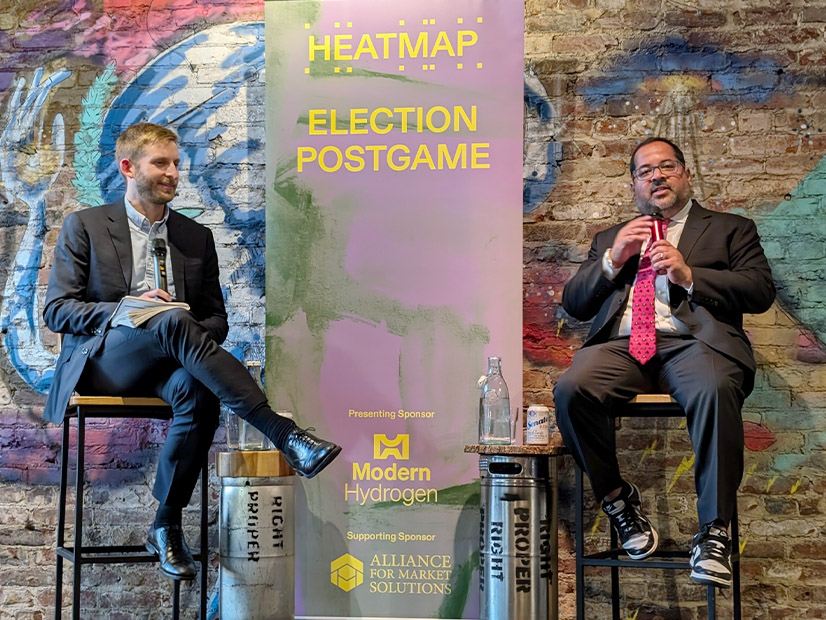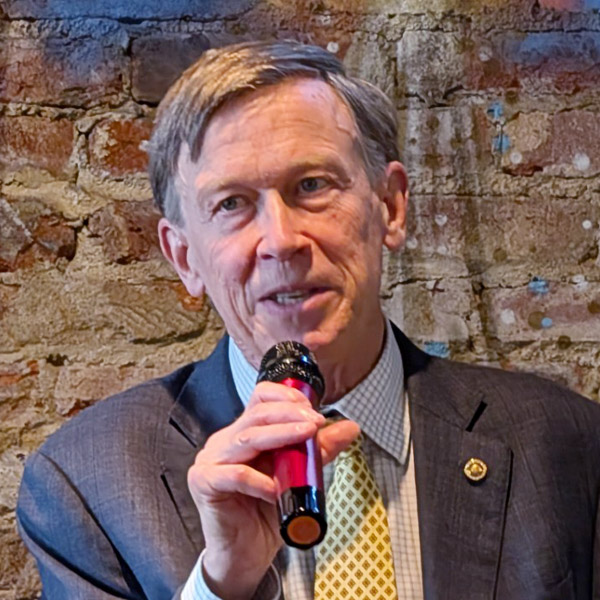
WASHINGTON — Both Sen. John Hickenlooper (D-Colo.) and former FERC Chair Neil Chatterjee (R) see the current lame duck Congress as having the best, possibly last chance to pass the Energy Permitting Reform Act of 2024 (S. 4753) and get it to President Joe Biden’s desk before he leaves the White House.
“The bill that’s sitting there right now, I think we can get that passed,” Hickenlooper said Nov. 13 during a forum hosted by Heatmap News at the Shaw Brewpub & Kitchen. “I’m not saying we’re going to, but I’m saying I think we’ve got a very good chance of Republicans and Democrats lining up [and] saying, ‘Alright, I don’t like a lot of this, but we need it.’ And I think both sides might hold their nose, and we might be able to get the thing through.”
Chatterjee, now a senior adviser at D.C.-based law firm Hogan Lovells, is less optimistic. But he said, “If we don’t get it done in the lame duck, it spills into next year, and you’re not going to get a lot of Democratic support to pass a permitting reform bill, and Republicans are not going to abolish the filibuster to pass legislative permitting reform. … Republicans are not going to overturn the birdbath to do legislative permitting reform.”
Authored by Sens. Joe Manchin (I-W.Va.) and John Barrasso (R-Wyo.), EPRA would double the target for renewable energy on public lands from the 25 GW already permitted to 50 GW no later than 2030 while also cutting the time allowed for filing legal appeals against federal decisions on energy projects from six years to five months.
It would also require RTOs and ISOs to collaborate on plans for interregional transmission and allow FERC to step in to permit interregional transmission projects after one year if a state delays or denies a permit, even if the project has not been designated as being in the national interest. (See Manchin-Barrasso Permitting Bill Would Give FERC Transmission Siting Authority.)
The Senate Energy and Natural Resources Committee passed the bill 15-4 on July 31, but it has yet to go before the full Senate. Hickenlooper is a member of the committee and voted for the bill.
While energy industry trade groups have largely supported the bill, environmental organizations have opposed it. But Hickenlooper sees the lame duck session as an opportunity for an “alignment of self-interest” between Democrats and Republicans, industry and environmentalists.
“Most of the environmental organizations recognize that if we’re going to successfully address climate change, we’ve got to get transmission lines,” he said. “We can’t spend 20 years permitting transmission lines. We’ve got to figure out how to make sure we do that in a way that protects the environment, protects [the] cultural heritage of these sites, but we’ve got to go faster. … The sense of urgency that we have is not nearly sufficient. …
“If we miss the chance with the Barrasso-Manchin bill, we’re still going to have to do all this work,” Hickenlooper said. “We’re just going to do it six months or a year or two years down the road, and it just puts us further away from beginning to address the issue.”
IRA vs. Tax Cuts
Hickenlooper and Chatterjee also were cautiously optimistic that the clean energy tax credits and incentives in the Inflation Reduction Act would not be sacrificed to pay for extending the tax cuts passed in 2017.
Hickenlooper’s main argument was that the new working-class voters in the Republican Party are among those benefiting from the clean energy manufacturing jobs the IRA is creating. “Rolling back those efforts for the simple purpose of giving another tax break to the publicly traded stocks of America doesn’t seem constructive,” he said.
Dismantling the IRA will create more uncertainty and disrupt business plans, he said, and such unpredictability could leave businesses not knowing “whether anything that’s agreed to is going to stay the same for more than two years.”
Chatterjee said he believes that even with Republican control of the House of Representatives and Senate, extending the 2017 tax cuts and rolling back the IRA through a single budget reconciliation bill could require more political capital than the GOP can muster.
Budget reconciliation is a legislative maneuver under which a budget bill can be passed with a simple majority vote in both houses as opposed to the three-fifths usually needed for such legislation. Both the 2017 tax cuts and 2022 IRA were passed via budget reconciliation.
But, Chatterjee said, in the Republicans’ new “populist working-class party, there’s not necessarily unanimity around the idea of extending corporate tax cuts at the expense of exacerbating the deficit. … I think [President-elect Donald Trump] and Republican leaders in Congress will leverage their political capital to get that piece of it done. But then to layer on IRA repeal on top of it, or IRA modifications to pay for it, at that point individual lawmakers start to have tremendous influence,” he said.
While the Republicans might have enough votes to roll back the IRA’s tax credits for electric vehicles, other incentives — for clean hydrogen, carbon capture or tech-neutral clean energy — could have individual supporters. “The end result is things get heavy, and they get tough to pass,” Chatterjee said.
At the same time, Chatterjee expects that former Rep. Lee Zeldin (R-N.Y.), Trump’s nominee to head EPA, will roll back the Biden administration’s regulations aimed at reducing greenhouse gas emissions from power plants and automobile tailpipes, but “in a thoughtful way that focuses on rational outcomes.”
“He may pursue a deregulatory agenda but do it in a way that is respectful and listens and brings different stakeholders to the table,” Chatterjee said. “I think that’s a good thing.”
‘Deep Uncertainty’
Hickenlooper and Chatterjee also are thinking similarly about the need to depoliticize the debate around climate and energy issues as lawmakers and regulators face the impacts of increasingly frequent and severe extreme weather, while meeting growing power demand from artificial intelligence, data centers and new manufacturing.
Trump may call climate change a hoax, Hickenlooper said, but “that’s not going to stop me from trying to go out and make the argument that if you live in Florida and you look at how you’re going to get insurance for property, you better look pretty closely right now because it’s now the states … [that] subsidize people’s property casualty insurance.”
If available at all, home insurance rates have skyrocketed in Florida and in other states that have experienced repeated extreme weather events. As a result, many homeowners have to rely on state-subsidized programs.
“We Democrats and Republicans and independents have to start finding ways to get this in the media and talking about it in real time,” Hickenlooper said.
Chatterjee sees the potential for bipartisan action on electricity demand growth. Neither party has, thus far, “fully grasped what this coming surge in demand means,” he said. “I think there is universal agreement amongst parties that we need to win the AI race against the Chinese Communist Party for national security purposes … and power will be the key to winning that AI race.”
But, he said, political and business leaders will need to do a better job of explaining those imperatives to the public, which could be faced with “increased consumer prices or potential threats to resource adequacy and reliability or backsliding on our decarbonization goals.”
Democrats will have to accept the need to keep fossil fuel plants online, and Republicans will have to accept that meeting new demand will require both an aggressive deployment of renewable energy and new transmission lines, he said.
“I actually think we are on a precipice of a moment in which, because of AI, because of investments in domesticating the supply chain for the clean energy future … we are on a trajectory to where red supply can feed blue demand,” Chatterjee said. “We are at a tipping point where we can take politics out of the clean energy transition and decarbonization and actually focus on collective solutions.”
Hickenlooper said getting buy-in from American consumers will require setting out a clear plan for the transition.
“I don’t understand how we got so far down the road without any kind of plan,” he said. “It’s hard to imagine the American people sacrificing and paying more for energy … if they can’t see where it’s leading and what the next sacrifice is and what their benefits are; the money they are going to [save].”
Like Chatterjee, Hickenlooper says all generation technologies will be needed. But even with a plan, a key challenge will be “making decisions under deep uncertainty. … That’s what we’re going to have to do: make decisions when there are, in many cases, not enough facts.”
“We don’t have enough information to really have the confidence our decisions need,” Hickenlooper said. “But we have to keep making decisions under deep uncertainty because we do not have the time. We don’t have the luxury.”




